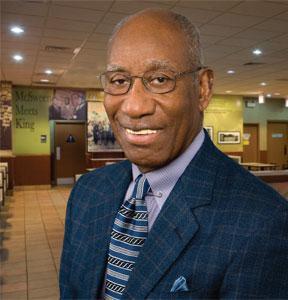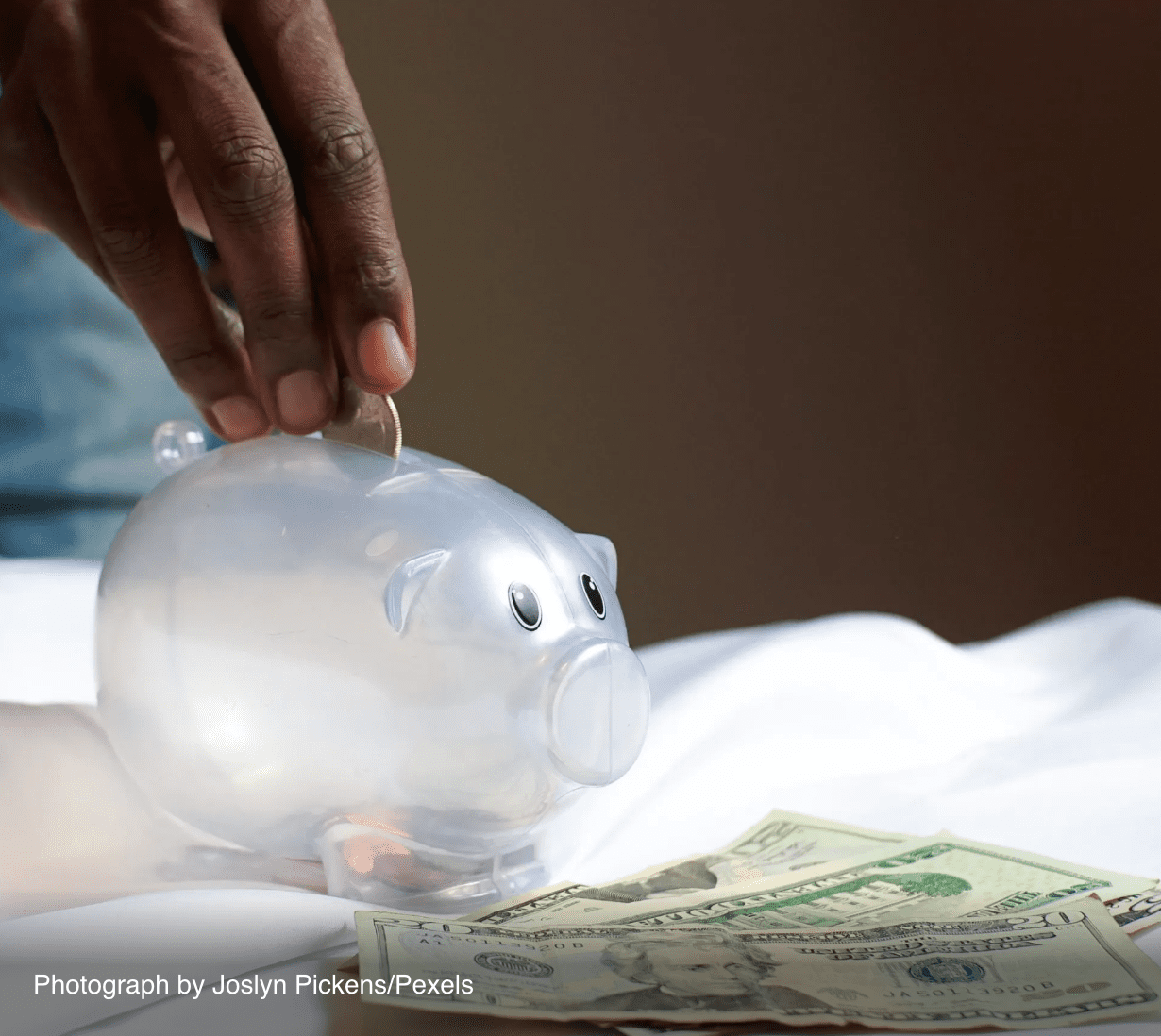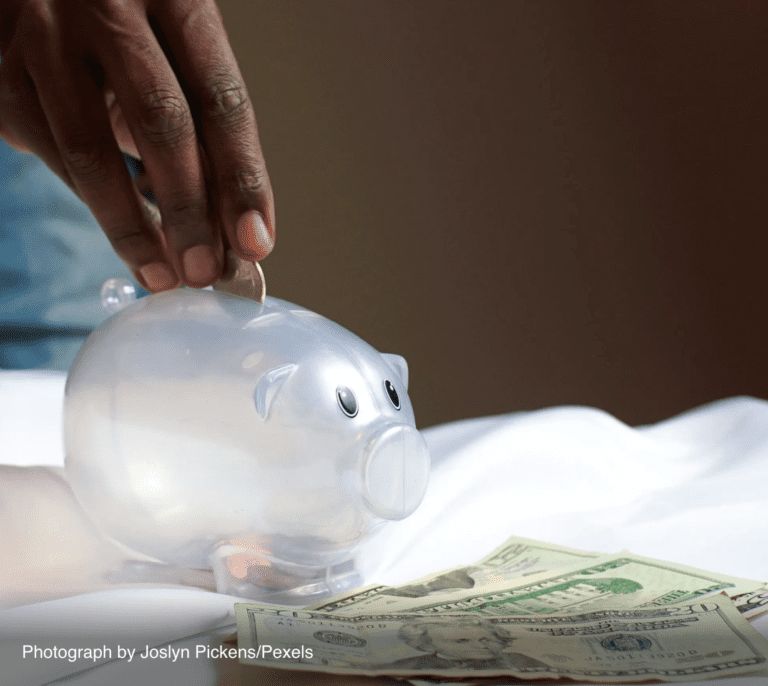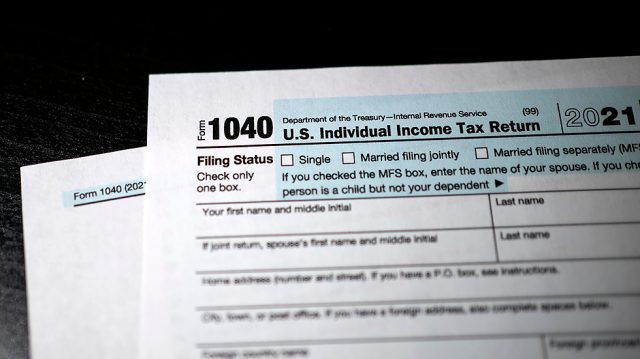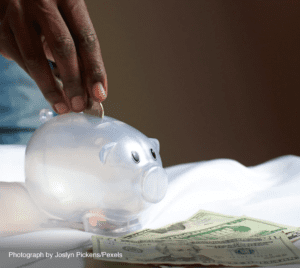New research suggests racism should be treated as a matter of public health. But the unique stressors faced by Black farmers remain poorly understood.
At 43 and 45 years old, husband and wife farmers Angie and Wenceslaus Provost, Jr., hope they live to see age 70.
They don’t fear terminal illness or a farm accident that could consign them to an early grave.
Instead, they fearstress could do them in. Years of trying to protect family land from encroaching banks and government agencies have worn on them, despite their love of farming.
Illustrations by Jaye Elizabeth Elijah.
After years of mounting debt with the U.S. Department of Agriculture (USDA) and a bank, the New Iberia, Louisiana sugar cane farmers filed a September 2018 lawsuit against a USDA-approved lender. The suit alleges that Wenceslaus, known as “June,” was all but run out of the profession in 2015 after the bank reduced his crop loans over successive years, effectively underfunding his farm operation. June also claims that the lender regularly dispersed his funds well past planting season, which hampered his ability to compete against other, mostly white, cane farmers in the region. Angie has had a separate and ongoing civil rights claim open against USDA since 2017.
Both Angie and June have been hospitalized with symptoms of a nervous breakdown. They endure fatigue, racing hearts, insomnia brought on by nagging fear they could lose everything: their homes, their cane fields, their tractors, even their lives. They have sometimes feared the stress might literally kill them. In 2008, June, a fourth-generation sugar cane farmer, was in his second season of farming alone when his father died of a heart attack after helping him chop soil to plant fresh cane. June’s father had fallen behind because his crop loans were delayed by his banking institution; both June and Angie feel the situation had become bad enough to put his health at risk.
“We’re very aware of the fact that the early death of our family members like June’s father and some of our other community members is due to that stress of being bankrupt and foreclosed on after going through such litigation like Pigford,” Angie said, referring to the class action lawsuits filed by Black Farmers against USDA for discrimination and failure to investigate civil rights complaints. “Those are issues of trauma. It’s a difficult thing, an almost impossible thing to live through, unless you have a support system.”
Owing the USDA more than $1 million, June at one point questioned his desire to live. “At my worst, I contemplated suicide,” he said. “I felt there was no one I could turn to.” The future seemed to be certain death by a thousand bureaucratic hurdles, racism, stress, and overwork.
In some ways, the Provosts’ story is familiar to anyone working in agriculture. All farmers and ranchers know the standard hardships of their profession–from the high costs of doing business to being at the mercy of uncontrollable forces. The financial risks are high, and crop prices are always in flux. A devastatingly adept predator might make off with some prized livestock. Pests may gorge their way through rows of promising crops. The physical work is hard on the body; the pesticides are too. And while weather is always unpredictable, climate change’s unseasonable droughts, flooding, storms, and freezes add to the strain. Those problems make farming one of the most stressful occupations in the country.
But Black farmers have to contend with an additional menace: the systemic racism that has long marred U.S. agriculture. These producers face down all the typical hardships while also navigating other hazards, including legal battles with the government, discriminatory lenders, opportunistic land grabbers. These painful interactions tend to underscore the racist–and tragically long-standing–myth that Black people don’t belong in farming, and don’t deserve the tools required to succeed.
“So many Black farmers–June’s father, his uncles, my aunts and uncles, our community members, our kin–have the same story: sitting there in a USDA office waiting to be serviced, and never being serviced properly; being told by local agents that you will not succeed,” said Angie. “‘You will fail.’ ‘You are not a farmer.’ Those types of things are told to you directly.”
These grinding forms of discrimination take a deeply personal toll, contributing to a mental health crisis among Black farmers that’s at once acute and yet hard to see. Help is not exactly on the way. While programs do exist to help farmers handle the stress of the profession, many existing lifelines are geared toward the approximately 95 percent of U.S. farmers who are white, downplaying or outright ignoring the specific forms of distress that stem from race-based prejudice. Though a small but vital body of research points to the need for a more inclusive approach, and at least one advocacy group is working to better understand the scope of the problem, few efforts are being made to address the problem on the ground. For now, too many farmers still have nowhere to turn, their suffering largely rendered invisible within the support systems that exist.
“It’s that psychological impact that I’ve seen happen to many Black farmers,” Angie said. “You have to understand it’s a repeated pattern. It tears you apart mentally and physically.”
Farmers tend to confront high levels of uncertainty and hardship. But Black farmers have to contend with an additional menace: the systemic racism that has long marred U.S. agriculture.
The research gap
In 2021, the USDA announced $25 million to state Farm and Ranch Stress Assistance Networks (FRSAN) to build crisis hotlines, establish anti-suicide trainings, and offer free or low-cost counseling, among other services. It was an important step toward recognizing the emotionally grueling, often isolating nature of farm work. But it did little to respond to the needs of Black farmers, who tend to operate smaller farms, face increased economic pressure, and are routinely exposed to racism in agriculture and beyond. Of the 50 FRSAN projects USDA funded in 2021, only 7 programs–in Maine, Massachusetts, Minnesota, New Hampshire, New Mexico, North Carolina, and Rhode Island–pledge to make efforts to accommodate the specific needs of communities of color.
It’s yet another indication that the bulk of U.S. research on farming and mental or behavioral health and stress focuses on white farmers. And while that may partly be a function of demographics–Black farmers make up 1 percent of growers nationwide, a stat that itself testifies to the exclusionary force of systemic racism in agriculture–important research or diagnostic tools fail to be race-sensitive. Without these mechanisms, it’s difficult to provide informed treatment that responds to the specific needs of Black farmers and could improve their physical and mental well-being.
The Farm/Ranch Stress Inventory, created by psychology doctoral student Charles K. Welke in 2002, is a tool that assesses stress, satisfaction and perceived social support among farmers and ranchers. It asks dozens of questions to assess a farmer’s anxiety level and is sometimes adapted for studies of farmer well-being. But its questions focus mostly on financial and family matters; while it inquires about conflict with relatives or community, no question mentions race or racism specifically. In another example, a 2021 Farm Bureau-commissioned study of 2,000 rural Americans found that farmers and farm workers were significantly more likely to have said their stress increased in the last year than their non-farming neighbors. But the insurance and lobbying giant told The Counter that it did not analyze its data by race.
Laketa Smith manages the Farmers of Color Network of the Rural Advancement Foundation International (RAFI-USA). In collaboration with N.C. State University, she and North Carolina-based RAFI are conducting an ongoing study of farmer mental health and financial stress. Unlike many other studies, that research is intentionally oversampling farmers of color. Though the study won’t conclude until later this year, it will interview 15 Black and Indigenous farmers, respectively, in addition to the same number of white growers (a future iteration will include Latinx subjects).
While final results aren’t in,Smith said that there’s no indication that suicide is higher among those sampled. Still, preliminary results suggest that chronic stress is a feature of life for many Black farmers, and that stress can manifest in a variety of ways, from family conflict or separation to substance abuse, depression, anxiety, and ill physical health.
“Pride is the flip side of shame, and [when money problems happen and land loss is possible], there’s a lot of shame over being in that position,” Smith said. “Farming is often not [simply] what they do. It’s who they are. They’re fourth or fifth generation. And sometimes they think ‘This land’s been in the family for years, and I got us in trouble.'”
Racism as risk factor
It’s a realm of lived experience that’s also established science: Being subjected to racism is unhealthy. Even encountering the more subtle, daily varieties can be stressful–and, over time, that stress can impact mental and physical health outcomes in concrete ways. A 2013 article in The Atlantic summarized the current state of the medical literature, which draws links between discrimination and increased rates of hypertension, the common cold, cardiovascular disease, breast cancer, and even general mortality. One study of 30,000 participants found that racism-induced stress is directly related to poorer physical and mental health. It’s a phenomenon that social psychologist Nancy Krieger calls “embodied inequality”–and these damaging linkages have only become better established in recent years.
“The perception of racism, that feeling can have an impact on psychological well-being,” said Telisa Spikes, a cardiovascular researcher at Emory University who has conducted studies on the impacts of financial and racial stressors on African American health. “Your body responds by going into fight or flight mode–blood pressure goes up, heart rate goes up. When you’re constantly in this hypervigilant state it can have a negative impact on health.”
Spikes describes hypervigilance as a heightened response to prior racial trauma that leads African Americans to anticipate negative or discriminatory experiences when they are in predominantly white spaces.
“You have this stigmatized status as a Black person where you feel you always have to be constantly on watch,” she said.
Epidemiologist Camara Jones has long made the case that racism is a public health crisis. Notably, she has called on fellow researchers to prioritize data collection by race, urging them to focus their attention on the root causes of racial differences in health outcomes.
“When we collect data by race, our findings most often reveal significant race-associated differences in health outcomes,” Jones wrote in a 2001 article published in the Journal of American Epidemiology. “The differences are so ubiquitous across organ systems, over the life span, and over time that they do not surprise us or seem to require explanation. Indeed, only when there is a White excess in disease burden, as with suicide, is our professional interest piqued.”
More recently, researchers have continued to probe the role that racism plays in lowering Black Americans’ life expectancy. A 2020 Auburn University study concluded that stress caused by experiencing racism accelerates aging at the cellular level; while a study published by Georgia State University in 2019 found that experienced over time, racism and long term anxiety could “wear and tear down body systems,” weighting the body’s allostatic load–the lifelong build up of stress–and putting African Americans at greater risk for chronic illness.
“Health cannot be separated from the social environment. Many of the disparities that we see are a result of the social environment. And going back to clinical research, you cannot address problems without highlighting the racial demographic and the role that social determinants play in contributing to these disparities,” Spikes said. “Racism is now listed as a fundamental cause of disparities. It may not be experienced in the form of interpersonal racism–I’m going to charge you a higher price because of the color of your skin–but it’s more of the institutional and systemic racism. The trickle-down policies that derive from that is what has negative implications for health: not being able to afford housing in a good school district if you have children; not being able to get a loan for a mortgage,” said Spikes.
Those risk factors are only magnified and exacebated within the context of farming, where discriminatory individuals, processes, and systems can continually threaten one’s livelihood and land. Combine U.S. agriculture’s institutionalized racism with the profession’s inherent volatility, and there’s an argument that Black farmers are at heightened risk for all manner of stress-related ailments.
It happened to Lucious Abrams. The 68-year-old Georgia farmer was denied compensation as a claimant to 1997’s Pigford v. Glickman racial discrimination class action lawsuit against the U.S. government. He has filed numerous legal measures since then to delay foreclosure, and rents his farmland to neighbors to keep the taxes paid. After three decades wrangling with USDA, his body became a vessel of agony and apprehension.
“I had kidney failure. I had a blood vessel burst up in my colon. My wife had a nervous breakdown. There’s no way to tell you the trauma that we have been through over the years. Through God’s grace and his mercy … that’s the only way I know how [we’ve survived],” said Abrams. “It’s been an absolute nightmare.”
Kentucky State University economist and rural sociologist Marcus Bernard worked with farmers in Alabama’s Black Belt region as the former director of a rural training and research center for the Federation of Southern Cooperatives, a nonprofit association of about 20,000 mostly Black farmers and landowners. While completing his PhD at the University of Kentucky, Bernard examined how racism, institutional racism, and class conflict affected Black male farmers. His research identified high levels of acute stress in both African American men and women farmers, typically wives of the male subjects he interviewed.
The long and well-documented history of Black mistreatment at the hands of the USDA, its partners, and agricultural colleagues also produces well-founded anxieties that bias will put more roadblocks in Black farmers’ way.
“When you think about a picture of whites farming [and] then think about a picture of Blacks in agriculture, those are two very different experiences,” said Bernard. “The picture with Blacks in agriculture is marred by stigma and labels: a feeling like ‘Someone is always out to get me.’ Like ‘I’m not going to get a fair shake.’ Either ‘I’m going to get shorted on my price,’ ‘Somebody is after my land,’ or ‘I may not get the financing that I need.'”
For decades, USDA and associated lenders withheld critical loans from Black farmers on the basis of race–only one factor among many that gave white farmers an unfair disadvantage, and a shorter path to profit. Today, countless hurdles remain, from fierce, hyperlocal cronyism that excludes these farmers, to price manipulation that drives down their profits and earnings, and excessive collateral required to secure loans that put them at risk of losing everything if they fall into debt–a shameful legacy that is literally written across Black farmers’ bodies.
For 26-year-old farmer Tamarya Sims, the anxiety lies not in the fear of dispossession–but in the fear that she may never own land at all. Sims is a landless Black farmer in Asheville, North Carolina. By day, she works for a land trust, managing chickens and bees on a community farm. She runs her own business, Soulfull Simone Farm, on the side. The urban flower and herbal farm takes up less than half an acre of rented land.
Sims, who experiences anxiety related to attention deficit hyperactivity disorder (ADHD), hopes to one day own 60 acres of forested land she envisions as a “healing space” where she can grow herbs and plants, and visitors of color can attend workshops and feel welcome. She describes the distress she deals with as threefold.
“There’s the stress of being a farmer, then there’s the stress of being a Black farmer, and then of being a landless farmer,” she said. Added to the anxiety she feels, these stressors can make it difficult for her to focus, sapping her energy and ability to solve problems that may arise on the farm.
As a Black female agriculturalist in an overwhelmingly white area, Sims has experienced strong feelings of alienation. When she spoke out in the wake of George Floyd’s death, she became instantly and uncomfortably recognizable in her community.
But invisibility, rather than hypervisibility, has been the norm for her. When white visitors stop by the community farm, they often pass her wordlessly, seeking out the first white face they can find as an authority. When she was shopping for her own tractor, she brought a white male associate with her to the dealership, for fear she wouldn’t be taken seriously or get a fair deal. The sales agent spoke exclusively to the white man and refused to look her in the eye, she said. Knowing she must enlist the same tactic in her search to acquire land is upsetting and tiresome.
“One of the main recurring things I’ve went through is being on land and folks seeing me and thinking that I don’t belong just because I’m Black. Even at my job, I’ve had people slowing down in their cars to see what I’m doing.” If they come onto the land, they ignore her just as the tractor salesperson did. “There’s nowhere I can go where people see me and think I belong, or where I feel safe.”
This feeling has been a primary motivator in Sim’s desire to carve out her own piece of land where she can enjoy the restorative benefits of nature that all farmers love: the joy and relief that comes from digging in the dirt, watching a tiny seed shoot out roots long before its verdant foliage begins to show.
“I work through a lot of my life issues in the garden, and I think that everyone should have the opportunity to do that… When you connect people with land, they see the mountains behind them, and they feel comfortable,” she said. It’s a feeling of ease she continues to chase and an irony many Black farmers experience: that working the land can relieve stress, while also exacerbating it.
In the absence of doctors they can trust, and with rural mental health providers in short supply, many Black farmers lean on religion and their community to lessen their mental anguish.
Community as coping
Former cattle farmer Michael Rosmann is a psychologist who has worked with farmers and institutions for more than 30 years to raise awareness about the importance of behavioral health in agricultural communities. His work with the nonprofit Agriwellness Inc., a partnership initiative between seven Prairie states facilitated by the Wisconsin Office of Rural Health, informed the framework of USDA’s Farm and Ranch Stress Assistance Network.
“The traits that define successful farmers are a capacity to endure extreme hardship, the capacity to work alone, if necessary, self-reliance for making decisions, and keeping things to oneself. These traits cut across all races and cultures,” said Rosmann.
However, these characteristics can have a downside: a reticence to divulge thoughts and emotions to behavioral health professionals or scholars who could document farmers’ individual or collective mental health needs. To combat this, Rosmann emphasizes a need for counselors and therapists who have a shared understanding of not only agriculture, but the complex racial and cultural histories these farmers hold.
In practice, that’s not always easy. Rural communities, where most farms are, often lack the medical resources and services offered in major cities. At the same time, only about 3 percent of U.S. psychologists are Black. For farmers, these factors–the disparity in health care services and the lack of representation among health care professionals–mix with other forms of inequity to create barriers to relief from occupational stress.
In the absence of doctors they can trust and enough rural mental health providers, many Black farmers like Abrams lean on religion to lessen their mental anguish.
“There is still within this community of older Black farmers, deeply spiritual, deeply rooted ties to their churches. Their spiritual life is what I believe is the No. 1 thing that keeps them sane and grounded,” Kentucky State’s Bernard said.
He speculated that faith may offset suicide risk among Black farmers. But because Black farmers are not often studied or written about outside the bounds of their racial experiences, there’s little to no information about the prevalence of suicide and self-harm among them.
That most Black farmers turn to social networks for support bears out an aspect of Farm Bureau research: in general, farmers are far more likely to tap their friends and family for help than seek a doctor’s advice.
Kaleb “KJ” Hill, 35, is a fourth-generation farmer from New Orleans and the founder of Oko Vue Produce Co., an agricultural business that specializes in edible landscapes and stormwater management.
He looks inside and outside his community for assistance.
“A lot of [farmers] are not very vocal with what they’re going through. They’ll speak in a lot of cliches, like ‘You know, it’s just part of the job.’ But the way I live my life, I share if I’m seeking additional support,” Hill said.
Though he doesn’t presume to recommend mental health services to his peers, “we usually talk to each other,” he said.
“That’s important,” he went on. “I won’t say it’s like traditional group therapy or anything that’s facilitated by a professional. It’s just us sitting around in a circle or gathering at the end of the season, and having a little dinner together with some of the things we have left over and just talking about how that was a rough year. It’s an ongoing conversation. You’re venting like ‘Man, that was frustrating, this insect ate up everything. What did you do about it?’ That’s a therapeutic session in itself.”
Still, traditional talk therapy keeps him “in touch with reality and it’s helped me grow as a man. … Sometimes you have these emotions that you don’t necessarily have a word for and that professional does,” he added.
The Provosts also sought help to alleviate their feelings of despair. Both now speak with a therapist regularly. They say it’s had a marked effect on their ability to cope with the day-to-day stress incurred by attempts to preserve their livelihood. But the fight is long from over. What was once an almost 5,000-acre family sugarcane operation—June’s family owned about 300 of those acresand rented the remainder–is now a mere 36 acres, split between June and one of his brothers. Angie’s civil rights claim remains open, and Congress’s effort at debt cancellation, which would have offered them a much-needed reprieve, remains stalled.
Additional reporting contributed by Cynthia Greenlee.


